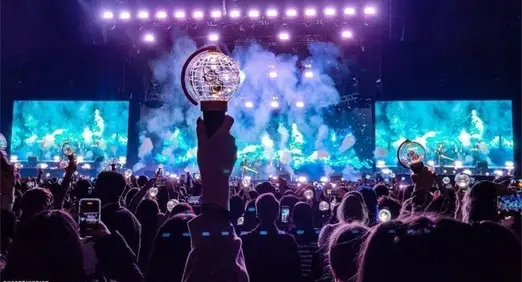
Back in the second and third generations, the genre was raw, personal, and brimming with sincerity. Fans weren’t just consumers, they were part of something larger, a collective culture built on patience, loyalty, and community. People traded subtitled clips on forums, stayed up all night waiting for comebacks, and learned Korean through lyrics that meant something.
the downfall of kpop is that newer fandoms steered too far away from the sense of community that we had during 3rd and 2nd gen eras https://t.co/GWu49YP66q
— ny (@evnnemanager) March 26, 2025
The relationship between idols and fans wasn’t polished or packaged, it was built on mutual growth and emotion. Kpop wasn’t perfect, but it was real. It was human.
Somewhere along the way, that changed.
In the race for virality and global reach, Kpop has become more about metrics than music. What used to be a scene rooted in artistry has turned into a machine fine-tuned for engagement and profit.
It’s always “kpop isn’t fun anymore” (which is a whole different topic) but we need to talk about how kpop doesn’t FEEL like kpop because big companies keep hiring outsiders to make them “mainstream pop hits” and then small labels see that and go “oh! we should do the same!”
— moon 🌙 (@goldenstarjeon) September 29, 2025
Every fan interaction is now a monetized experience, a virtual call, a pre-order, a hashtag campaign. The sense of intimacy that once defined fandoms has been replaced by algorithmic proximity. The relationship feels less like a bond and more like a transaction, you pay, you get a glimpse. You stream, you’re rewarded with numbers. But the warmth? The connection? It’s fading.

The shift accelerated after the pandemic. With physical fan meetings and concerts gone, Kpop’s entire structure moved online, and so did the emotional exchange. What used to be spontaneous interactions became structured events designed for mass participation. Digital fan meetings replaced personal moments. Livestreams replaced laughter. While accessibility increased, authenticity declined. The fan-idol dynamic, once defined by empathy and mutual admiration, now feels eerily corporate. Intimacy became a subscription model.
The industry itself has evolved into a fast-paced ecosystem where virality overshadows longevity.
as much as i get why the genre made this shift and try to enjoy each gen as its own thing, you can’t help but miss how campy and yes even cringey kpop used to be, like ik its mostly nostalgia but 2nd gen/early 3rd gen was SO fun
— yan (@artmsphex) July 22, 2025
Labels prioritize instant visibility, debuting countless groups in hopes one will trend. The emotional storytelling that once anchored Kpop is now often secondary to marketability. Fans, meanwhile, have become unpaid marketers, streaming, trending, and defending their faves with relentless dedication.
Idk if I’m getting old but the new generation of kpopers are not for the music anymore…all they do is COMPLAIN (outfits, photoshoot, merch, album inclusions, makeup, etc) back in 2010 people didn’t give af about that cause they care more about THE MUSIC and it was much fun! pic.twitter.com/XykSsLmHAh
— Lilah 🩶 (@xchoi_nunchix) July 6, 2025
Streaming isn’t about listening anymore, it’s about maintaining a scoreboard. The artistry, the vulnerability, the imperfections that once made idols human, all swallowed by a system obsessed with perfection.
it’s unsettling to see people blindly support anything here just for the sake of “streams” or popularity, only to later question why kpop doesn’t feel the same anymore. surprise! your uncritical support for anything is what’s driving the change.
— jiji⁷ 🍓 | #ARHCTS (@ttalgihues) January 22, 2025
Kpop’s global dominance is undeniable, but so is the emptiness that sometimes comes with it.
The genre that once united millions through shared emotion now often divides them through competition and metrics. The “family” feeling between fandoms and artists has been replaced by a corporate model of fandom-as-consumer-base. We used to feel music. Now we measure it. We used to wait for a comeback because we missed someone, not because we needed to hit 10 million views in 24 hours.
kpop has become boring, repetitive and bland, with less and less talented groups, with more and more generic music that has become a caricature of kpop, and groups whose only proof of influence is the fact that they sell millions, without this being reflected elsewhere
— pika✴︎🍋 SAW BAEKHYUN (@_baekachu_) September 4, 2023
And yet, somewhere beneath the noise, something still glows. Amid the chaos of numbers and engagement goals, there are still artists who write from the heart, and fans who listen not to count streams, but to reconnect.

Maybe Kpop hasn’t lost its soul entirely, maybe it’s just buried under algorithms and analytics, waiting to be rediscovered.
Or maybe, and it’s a hard truth to admit, nothing really changed. Maybe the system didn’t steal the soul of Kpop. Maybe we just grew up.
The same songs that once made our hearts race now remind us of who we were back then, younger, freer, unguarded.
Perhaps the magic didn’t vanish, perhaps it evolved, just as we did. The thrill we miss might simply be the innocence of discovery, something that belongs to a version of us that no longer exists.
Kpop really has changed a lot over the years, and it may be nostalgia (or the fact I’m a decade older…damn) but I do miss the old kpop vibe
— Damian 🍀 (@chungholism) May 4, 2025
Because for every statistic, there’s still a story.
And behind every fan who streams endlessly, there’s still someone who remembers why they fell in love with this world in the first place.
